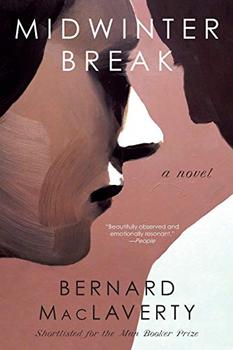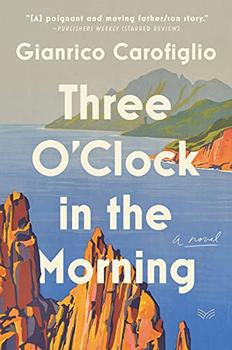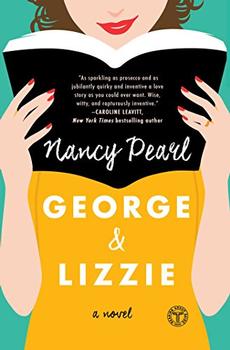Summary | Excerpt | Reading Guide | Reviews | Beyond the book | Read-Alikes | Genres & Themes | Author Bio

Northern Ireland's Bernard MacLaverty is the author of five novels and multiple short story collections. The main characters of his new book, Midwinter Break, are Stella and Gerry Gilmore, an Irish couple who live in Scotland and are in perhaps their late sixties or early seventies. Stella, a former English teacher, has thrifty, precise habits and solves crossword puzzles to keep her mind sharp. In the years since he retired as an architect, Gerry, once thoughtful and enthusiastic, has started drinking to excess; it's now rare for him to be without a bottle of whiskey to hand.
This short novel opens on the night before Stella and Gerry set off for the Netherlands on a brief vacation, and ends in the airport on their way back home. The limited time span and settings – the couple's home in Glasgow plus various locations in Amsterdam, mostly interiors – are qualities that would lend themselves well to a film or theater adaptation. The characters visit a number of the city's most famous tourist destinations, including the art treasures of the Rijksmuseum, and grab a drink in the dubious red light district. Those who have never visited Amsterdam will enjoy the virtual tour as much as those who are familiar with the city.
Unfortunately, the author's determination to follow these characters through all the wearisome tasks of travel, including airport check-in, getting on a train, finding their hotel, etc., along with the everyday indignities of older age, means the narrative turns mundane at times. Their days quickly take on a repetitive quality: Gerry drinks while Stella naps; they go out to a tourist attraction and then recuperate with coffee; they later go out to dinner; and so on. Undoubtedly this building up of routine is meant to reflect the often predictable nature of a long marriage, but it can seem tedious. Some sequences also overstay their welcome, like Stella's overwrought meditations in the Anne Frank House and Gerry's mental litany of all the things Stella knows.
Luckily, flashbacks and glimpses into the characters' thoughts open up a new dimension so that readers should not feel they are stuck with a boring old couple on a staid holiday. Although it's told entirely in the third person, the novel moves fluidly back and forth between Stella and Gerry's perspectives, revealing how they perceive each other and hinting at a traumatic incident they experienced some four decades ago in Northern Ireland when Stella was pregnant with their son, Michael.
MacLaverty sensitively explores how Gerry's drinking is bringing his marriage to a crisis point – another possible connotation of the title's "break." "I have a sense of drift. I want to do something with the time I have left. Other than watch you drink," Stella expresses to Gerry. She feels she and Gerry are "in different places" in their lives, especially given her religious bent. While Gerry gave up on Catholicism long ago and feels "all religion should be in museums," Stella has become more devout over the years and uses her time in Amsterdam to explore how she might live a more pious life (see Beyond the Book).
This religious theme was intriguing for me, as were the allusions to classic Christian writings. For instance, Gerry recalls his half-hearted New Year's resolution to give up drinking: "But not yet, O Lord, not yet," he thinks, in an echo of St. Augustine's Confessions. Stella quotes Julian of Norwich's "All shall be well" refrain on several occasions, and also cites Bede's image of life as a bird flying into and out of a room – fleeting. Secular literature is also a point of reference, like a late scene in which Amsterdam is engulfed in snow that brings to mind the ending of James Joyce's "The Dead."
I imagine the religious content could be a turnoff for readers who are unfamiliar with Christianity and/or have a different frame of reference. Gerry also sometimes struck me as a clichéd picture of the jolly drunk. However, my overall response was one of admiration for what this couple has survived and sympathy for their current situation – with hope that they'll make it through this, too.
![]() This review was originally published in The BookBrowse Review in September 2017, and has been updated for the
August 2018 edition.
Click here to go to this issue.
This review was originally published in The BookBrowse Review in September 2017, and has been updated for the
August 2018 edition.
Click here to go to this issue.

If you liked Midwinter Break, try these:

by Gianrico Carofiglio
Published 2022
A coming-of-age novel—a heady union of Before Sunrise and Beautiful Ruins—about a father and his teenage son who are forced to spend two sleepless nights exploring the city of Marseilles, a journey of unexpected adventure and profound discovery that helps them come to truly know each other.

by Nancy Pearl
Published 2018
From "America's librarian" and NPR books commentator Nancy Pearl comes an emotionally riveting debut novel about an unlikely marriage at a crossroads.
Your guide toexceptional books
BookBrowse seeks out and recommends the best in contemporary fiction and nonfiction—books that not only engage and entertain but also deepen our understanding of ourselves and the world around us.